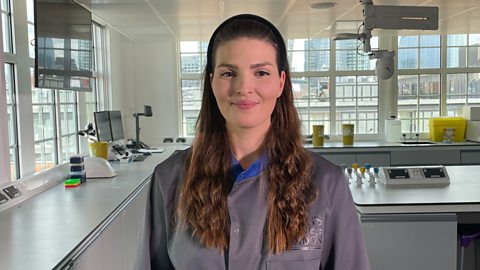Meet Fraser, 24, a trainee solicitor at Freeths law firm in Oxford. Find out more about his job and journey into the role.
Part of our Bitesize world of work series.
Being a solicitor is an incredibly rewarding job.
Fraser:
Hi, I'm Fraser and I'm a trainee solicitor. I work with people and businesses to support all of their legal needs.
As a trainee solicitor, on a day-to-day basis, usually we'll have a team meeting and find out what we've got in the day and week ahead. Researching, speaking to clients to get facts and information to help us write legal documents, or prepare papers for court, or speak to the court on different matters.
What I most enjoy about my job is the people that I work with and the variety of things that I do in my job. I can advise on one area of the law in the morning, and a different area of the law in the afternoon, and that really stimulates me because I find it fascinating to learn about so many different areas of law.
Well, there's lots of scope for progression, I would start off as a junior solicitor where I have more responsibilities than I do as a trainee, and I will work with senior lawyers all the time to develop my skill set and my knowledge base. I hope to become a partner maybe, one day, and build a team where I can then train up the next generation of lawyers.
The firm I currently work at have been extraordinarily supportive in helping me develop as a lawyer, by giving me opportunities to do lots of training and to go to lots of networking events, but also by supporting me in terms of making sure that with my visual impairment I have the right technology and support networks around me to make sure if I have an issue, there's always someone to talk to.
I think I'm a good trainee solicitor because I'm very passionate about what I do and I really enjoy the technical nature of the work that I do as well.
I'm very good at dealing with problems and giving a practical solution, and in doing so, building in quite technical nuanced legal points in a concise way that's really easy to understand.
Philippa, employer:
So, Fraser joined us as a summer placement student. He really impressed us, and as a result of that we asked him to come back as a legal assistant, which is a stepping stone to becoming a trainee here.
Fraser has really good organizational skills, and that's one of the key requirements of a lawyer.
(to Fraser) I love the detail of it.
Fraser:
Good, okay.
Philippa:
(to Fraser) It's really well, really fantastic.
In terms of attributes, he's got a fantastic sense of humour, which really helps, particularly when things are getting tough. He's also, from an IT perspective, got excellent IT skills and that's very important in the law.
Fraser was a stand-out candidate, and he's doing a fantastic job as a trainee here with us.
(to Fraser) I think it's full for now, so if you can grab that detail.
Fraser:
(to Philippa) I can do that, that's no problem.
What I love most about being a trainee solicitor is the variety of things that you learn and do, which means I get a breadth of experience, covering a whole load of issues with different clients.
You can help clients find justice in criminal cases, you can help people buy their first home, or you can make a difference by asking your clients to think about the environment in their contracts and reducing the amount of plastic.
One of the biggest tips that I would share with someone thinking about becoming a trainee solicitor is that you might already have a lot of the skills that you need, and those could come from the hobbies that you have or the sports that you take part in.
Being a solicitor is an incredibly rewarding job. The law is so broad, there's something for everyone. There's so many different specialisms, there's going to be something that will appeal to you.
- As a trainee solicitor, Fraser provides legal advice on different areas of law to people, businesses, governments and organisations.
- He researches and writes legal documents, and works with his supervisor and senior colleagues to develop new ideas to help protect or solve problems for clients.
- The main skills and attributes Fraser uses in his role include communication, organisation, having a good sense of humour, and IT skills.
- English and IT are subjects that can be vital to a solicitor. Good general knowledge is also important, and Fraser draws on many subjects he studied in school, from environmental science to modern studies.
- After completing his Scottish Highers and Advanced Highers, Fraser studied Scots and English Law at university.
- During his degree, Fraser did work experience at the firm in Oxford. After graduating, he returned to work as a legal assistant.
- He was then offered the trainee solicitor role and began studying the Legal Practice Course, a set of exams you need to complete before qualifying as a solicitor.
- Once Fraser has completed his training, he will progress to junior solicitor and in the future hopes to become a senior solicitor or partner.

Top tips
- Research. Look online and explore at all the different types of law you can study. There will be something that interests you.
- Think about your hobbies. It might surprise you that many of the skills you've developed in your free time can be useful for a career in law.
- Find support. There's a lot of support available for people going into law. Take advantage of mentoring schemes and networking.
- The legal system in Scotland is different to England. There are different routes to qualification in England and Wales compared to Scotland, and different qualification requirements. It’s important to think about which route suits you best before you pick what to study.

What to expect if you want to be a solicitor
- Solicitor average salary: £25,000 to £100,00 per year
- Solicitor typical working hours: 37 to 50 hours per week
What qualifications do you need to be a solicitor?
You could get into this role via a university course or a degree apprenticeship. You'll need three A-levels, or equivalent, for a degree. Alternatives to A-levels include taking a T-level in Legal Services (England-only, from Sept 2023), which is equivalent to three A-levels. Check with your course provider which alternative qualifications they accept. Other routes include doing a solicitor degree apprenticeship, which usually takes around five to six years and you'll need your employer's support to do it. You could also work towards the role with a legal firm and do on-the-job training, or if you started a qualifying law degree, Graduate Diploma in Law (GDL) or Legal Practice Course (LPC) before 2021, you will be able to continue to qualify as a solicitor by the traditional route until 2032.
Sources: LMI for All, National Careers Service, GOV.UK.
This information is a guide and is constantly changing. Please check the National Careers Service website for the latest information and all the qualifications needed and the GOV.UK website for more on T-levels.
Find out more on the Prospects website about the role of a solicitor.
For careers advice in all parts of the UK visit: National Careers Service (England), nidirect (Northern Ireland), My World of Work (Scotland) and Careers Wales (Wales).

Lucinda: forensic scientist. video
Lucinda is a forensic scientist, testing and analysing evidence to help solve crimes.

Halimah: apprentice paralegal. video
Halimah is an apprentice paralegal at a commercial law firm.

Bryony: coroner's officer
Bryony investigates deaths on the behalf of the coroner.
